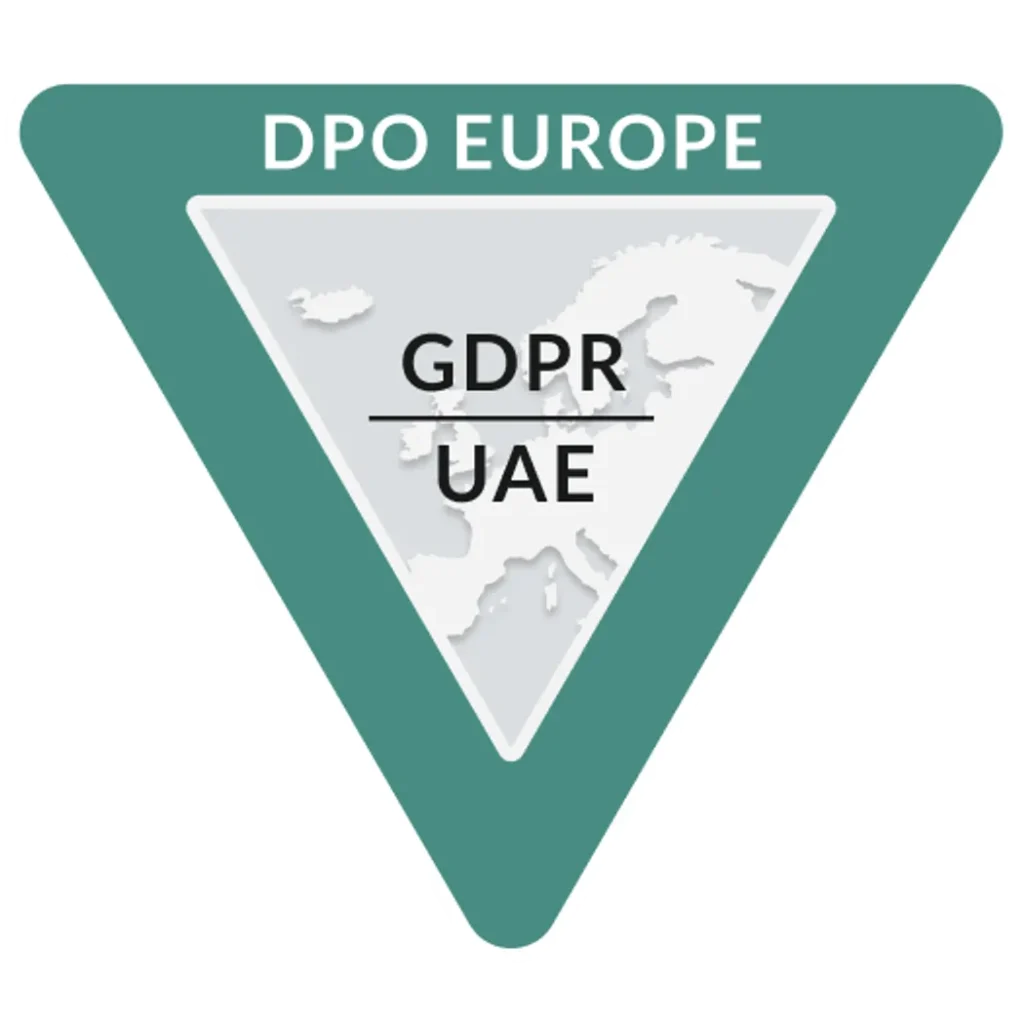UAE Data Protection based on GDPR
Intensive course on the intricacies of the UAE PDPL and how it compares to the GDPR.
- November 17, 19, 25
- €400
- 9 hours of online lectures and practical tasks
- 3 sessions, Monday, Wednesday, 15-18 СЕТ
- Electronic certificate via Accredible


When you need to learn UAE Personal Data Protection Law?
- Your company is relocating to the UAE or planning to promote its products in the Emirates market.
The course provides essential knowledge and practical tools to implement best practices and achieve compliance.
- You want to expand your privacy expertise by learning about another legislative framework.
This education will build a strong foundation to enhance your skillset as a Data Protection Officer.

The Federal Law-Decree on the Protection of Personal Data No. 45 of UAE has incorporated many provisions from European regulation. To take this course, you need to know the basics of European data protection regulation principles. You can learn all of these in our GDPR Data Privacy Professional course.
Get 20% off
the GDPR Data Privacy Professional +
UAE Data Protection based on GDPR package
Learn all essential basics of European regulation and enhance your knowledge with UAE-specific requirements.

Program
- Legislation on Personal Data Protection in the UAE Legal System
- Material Applicability of Emirati Personal Data Protection Regulation at the Federal Level and in DIFC, ADGM
- Definition of Controller and Processor and Distribution of Responsibility Between Them
- Territorial Scope of Emirati Personal Data Protection Regulation at the Federal Level and in DIFC, ADGM
- Principles of Personal Data Processing
- Legal Grounds for Processing in UAE
- Rules for Cross-Border Data Transfer
- Definition of Controller and Processor and Distribution of Responsibility Between Them
- Transparency of Processing
- Rights of Data Subjects and Their Implementation
- Information Security and Data Breach Notifications
- Role of Data Protection Officer
- Data Protection Impact Assessment (DPIA)
- Liability for Violations
- Interactions with Supervisory Authorities
- UAE PDPL Compliance 33-Step Scheme
We can scale training program to corporate training for teams, customizing it to the specifics of your business.
Course Format
- 3 days / 400 EUR
- Monday, Wednesday 15-18 СЕТ
- Practical tasks and tests
- Toolkit: Miro and Notion
- Electronic certificate via Accredible
Schedule
- Next start: November 17, 19, 25

Trainer
Frequently Asked Questions
What are the requirements for transferring personal data outside the UAE?
In accordance with the UAE Federal Decree-Law No. 45 of 2021 on Personal Data Protection (PDPL), companies are required to map their processes and identify cross-border data flows from the UAE to other countries, and then fulfill strict requirements for cross-border data transfer in accordance with the PDPL.
While the law emphasizes the necessity of adhering to “strict requirements” for cross-border data transfers, the provided sources do not detail the specific nature of these requirements. The primary purpose of the PDPL is to ensure the proper protection of personal data belonging to UAE citizens and residents by establishing rules for its collection, storage, use, and transfer.
What are the consequences of non-compliance with UAE data protection laws?
Failure to comply with UAE data protection laws can result in serious consequences for companies, including:
Administrative measures: fines, suspension of company activities, revocation of licenses, or restrictions on the right to enter into government contracts.
Fines can reach up to AED 5 million (approximately US$1.36 million) or a certain percentage of the company’s annual turnover, depending on the severity of the violation.
Criminal liability: for company executives, including arrest, fines, or imprisonment, depending on the severity of the violation.
How does the UAE Data Office support data subjects and organizations?
The UAE Data Office provides guidance and resources for both data subjects and organizations regarding data privacy and security, helping them understand their rights and obligations under the new data protection law.
What companies the UAE Data Protection Law Applies to?
The UAE Federal Decree-Law No. 45 of 2021 on Personal Data Protection (PDPL), which came into effect on January 2, 2022, applies to all organizations and companies operating within the UAE. This also includes foreign companies that have representative offices or branches in the country. Therefore, all companies, regardless of their size or industry, must comply with the requirements of this law and ensure the security of their customers’ and employees’ personal data.
However, the law does not apply to the following entities and types of data processing:
- The processing of personal data by UAE government authorities.
- The processing of medical, banking, and credit information, as these sectors are regulated by separate legislation in the Emirates.
- Companies established and registered in free zones, such as the Dubai International Financial Centre (DIFC)and Abu Dhabi Global Market (ADGM).
What is the role of a data protection officer (DPO) in the context of compliance with the UAE data protection law?
The role of a data protection officer in the United Arab Emirates is to ensure compliance with data protection laws, including the UAE data protection law. The DPO is responsible for overseeing data protection strategies, advising on data protection obligations, and serving as a point of contact for data subjects regarding their rights.
What are the key differencies between UAE Federal Law and GDPR compliance?
Both the UAE Personal Data Protection Law (PDPL) and the EU General Data Protection Regulation (GDPR) share a commitment to safeguarding personal data, but GDPR is stricter in its enforcement and scope.
Scope & Applicability:
PDPL applies to businesses in the UAE, excluding DIFC and ADGM, while GDPR has a broader reach, covering organizations worldwide that process EU residents’ data.
Legal Basis & Consent:
Both laws require a legal basis for data processing, including consent, contractual necessity, and legitimate interest. However, GDPR mandates explicit consent with detailed rules on withdrawal, while PDPL is less prescriptive.
Data Subject Rights:
Both laws grant access, rectification, and deletion rights, but GDPR goes further, offering data portability and stronger objections to automated processing.
Cross-Border Transfers:
PDPL restricts international data transfers but lacks a defined adequacy framework, whereas GDPR enforces strict mechanisms like Adequacy Decisions and Standard Contractual Clauses (SCCs).
Data Protection Officers (DPOs) & Breach Reporting:
GDPR mandates DPOs for high-risk processing, while PDPL requires them only in specific cases. GDPR enforces 72-hour breach reporting, whereas PDPL lacks a strict timeframe.
Penalties:
GDPR imposes severe fines of up to €20M or 4% of global revenue, while PDPL’s penalties depend on the nature of the violation. According to UAE legislation, fines can reach up to 5 million dirhams (approximately 1.36 million USD) or a certain percentage of the company’s annual turnover, depending on the severity of the violation.
Why will GDPR training be useful before learning data protection in the the UAE?
Despite all the differencies between the GDPR and the UAE PDPL, they have a lot in common. Strictly speaking the UAE PDPL included the majority of GDPR principles. That’s why we decided to make this course as an add-on to our fundamental GDPR Data Privacy Professional training. In this way you don’t need to waste time on repeating lessons. You can obtain all needed information about european data protection and then expand this knowledge with specific moments. These two courses will equip you with the knowledge to handle personal data securely, implement data protection policies, and respond effectively to data breaches, thus ensuring compliance with both local and international regulations.
What are the training requirements?
To become a certified data protection specialist in the UAE, candidates must undergo data protection and privacy training course that covers the principles of data protection law, GDPR compliance, and practical applications of data protection policies. For this aim GDPR Data Privacy Professional is an optimal choice. There you’ll get all required skills and knowledge to this course.


